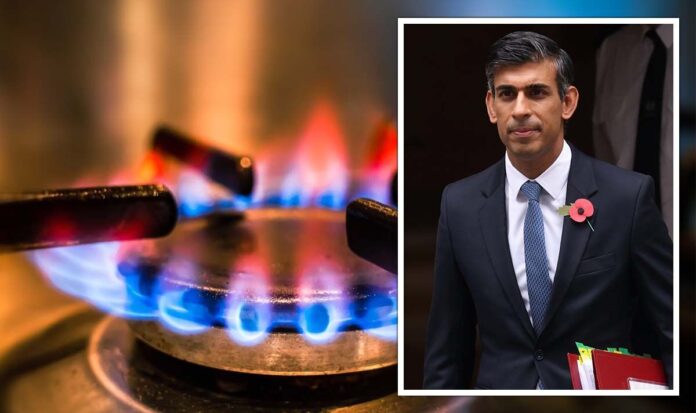A new analysis showed that Prime Minister Rishi Sunak could save £9billion for the Treasury, while also slashing £400 off their energy bills with a national energy reduction drive. The Social Market Foundation, a cross-party think-tank called on the Government to launch a nationwide drive to conserve energy, similar to one in Germany. The drive would include ways in which Britons can lower their energy use by turning off lights and lowering heating temperatures, which could slash bills by £400. Following Russia’s invasion of Ukraine, the German government launched a nation-wide campaign to conserve energy, amid fears that Russian President Vladimir Putin could cut off supplies this winter. Since the campaign was launched in September, the country’s gas consumption has been between 20 percent and 37 percent lower than at similar times in earlier years.In a new paper, SMF found that replicating such a campaign in Britain with similar reductions in energy use could deliver household savings of between £250-£400 a year.By reducing energy use, the campaign would also save the Treasury billions, since the Energy Price Guarantee policy currently means that taxpayers subsidise every unit of energy used in the UK.SMF estimated that £9.3billion of public finances could be saved in the UK’s energy demand fell as much as estimated. This, in turn, could lower the scale of spending cuts and tax rises that Mr Sunak and Chancellor Jeremy Hunt are preparing to announce later this month. Rishi handed energy lifeline to slash £9bn off bills while plugging Treasury black hole (Image: Getty) Germany launched an energy saving campaign in September (Image: Getty)Jake Shepherd, the Senior Researcher at Social Market Foundation, said: “In the face of rising energy costs, and despite the Energy Price Guarantee, households are and will continue looking for ways to reduce their demand for energy.”The Government should give them more practical information on doing so, instead of leaving them in the dark – or worse, making unacceptable trade-offs between heating and eating.”Far from ‘nannying’ people, Government guidance would empower them – and most importantly, help them save on their energy bills. Reducing energy use would deliver significant savings for the Treasury, potentially reducing the pressure on ministers to find money elsewhere with tax rises and spending cuts.”Berlin’s energy-saving campaign is based on the easy solutions available to consumers already looking to lower demand due to soaring energy bills.READ MORE: Macron scrambling to keep the lights on as EDF shuts down two reactors How much energy bills will you pay? (Image: Express)Germany’s package of energy-saving measures includes “offering practical tips, suggestions, and examples to make saving energy as easy as possible”, while also refraining from imposing harsh policies forcing households to slash consumption.Despite many calling for similar measures to be brought in the UK, former Prime Minister Liz Truss refused to launch a similar campaign, as the Government did not want to be accused of being a “nanny state”.While Mr Sunak has not his plans clear regarding energy saving, the SMF urged the Government to adopt a programme similar to the one in Germany. Even though energy bills have been frozen £2,500 per year for households, Citizen’s Advice has warned that energy-inefficient homes will not be shielded by the measure.DON’T MISS:Rishi warned as North Sea giant threatens UK exodus over windfall bill [REVEAL] Astonishing story of how Tutankhamun’s golden treasure tomb was found [INSIGHT] Golden asteroid worth £9 quadrillion targeted by NASA [REPORT] Insulation is a key way to slashing energy bills (Image: Getty)Jess Ralston, Senior Analyst at the energy and Climate Intelligence Unit (ECIU) hailed the insulation measures saying: “If prices stay high, the Government’s gas subsidy bill would be several times the investment needed to get all 28 million homes in Britain properly insulated.”Boosting the ECO scheme could well end up being cost neutral on Treasury with insulation cutting gas demand and so the overall price tag of the bailout.”


